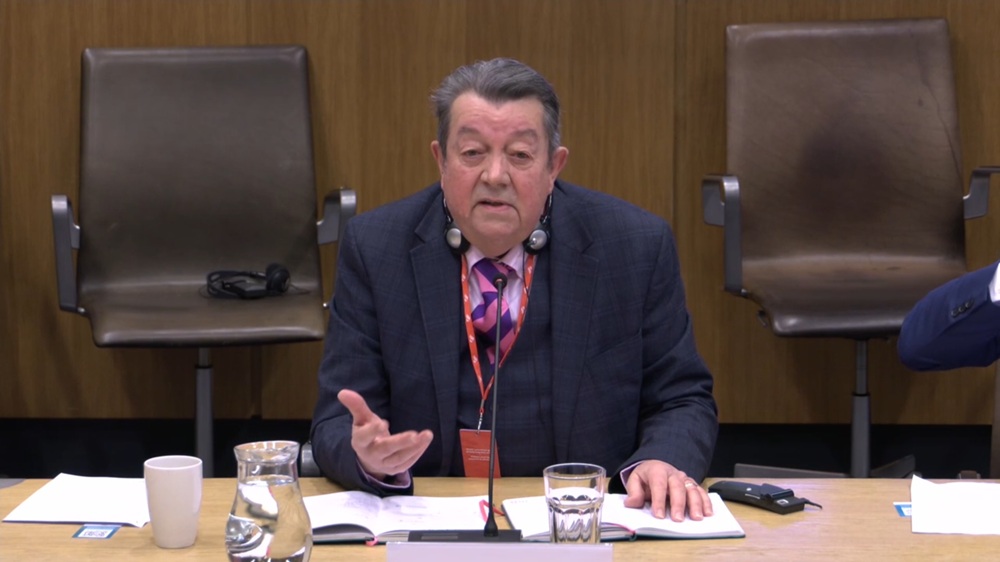Tourism tax cash ‘could plug gaps elsewhere’

Chris Haines, ICNN Senedd reporter
Money raised by a proposed visitor levy could be used to plug gaps in cash-strapped public services rather than support tourism as intended, the industry warned.
David Chapman, executive director at UK Hospitality Cymru, said the initial goal of the reforms – ringfencing funding to improve the visitor experience – has been eroded.
He told the Senedd finance committee: “We have within the proposed legislation, four items of potential spending that are actually removed quite considerably from that original ethos.
“I’ve lived all my life in Wales, we rely on public services, my family rely on public services, we use the health service – we’re all in favour of extra money going into that.
“But the intention of this originally was to try to assist the industry.”
‘700 job losses’
Mr Chapman argued the visitor levy bill is not watertight enough to prevent the revenue raised being used to plug gaps in other areas such as health and education.
As drafted, the bill says proceeds must be used to: mitigate the impact of visitors; promote the Welsh language; support tourism; or improve local infrastructure and services.
Mr Chapman said: “If you are of a mind to fill gaps in budgets and to replace and displace existing spending then those four qualifying areas would allow you to do that.”
Rowland Rees-Evans, chair of the Wales Tourism Alliance, raised concerns about rushing “headlong” into a levy, warning it could cost the economy £40m and lead to 700 job losses.
But he welcomed mandatory registration of visitor accommodation providers under the bill.
‘We’re not Venice’
Roy Church, co-chair of the Welsh Association of Visitor Attractions, described the bill as a “blunt instrument”, added that it is based on “hopelessly out-of-date” data from 2019.
He told the meeting on February 5: “The Welsh visitor economy is very different from what’s been looked at in the sessions before this committee.
“We’re not Barcelona, we’re not Venice, we’re not an international destination – our visitors come, 60% nearly, from Wales and the rest mostly from the UK.”
Mr Church, director of Tourism Swansea Bay, said: “It feels a bit like shooting yourself in the foot when you tax a local person to go to take their holiday break in their own country.
“The significance in our sector is the margins at which we work, we work generally with lower-income families … and this tax hits quite hard at their spending ability.”
‘Most taxed’
He was in favour of under-18s not having to pay the levy, as in France and Germany, arguing scouts and educational groups, for example, should be exempt.
Labour’s Rhianon Passmore asked about comparative taxes across Europe and the proposed rates in Wales, £1.25 a night or 75p for hostels and camp sites.
Mr Chapman replied: “We have 17 different taxes which apply to our businesses. We are probably, in fact I’m sure, we are the most taxed sector of any sector.
“We pay three times more than the relevant business rates that we should be paying.”
Mr Chapman told the committee it would cost an extra £63 a week, including VAT, for a family of six which could make a holiday unaffordable.
‘Awful’
Mr Rees-Evans asked: “Do we have to have VAT on tax? I’ve never heard of VAT on tax before. It sounds awful because tax is tax.”
Calling for a uniform rate across Wales, he said if one council went to £3 a night then the £63 for a family of six would leap to £126.
The witnesses welcomed a suggestion that the levy could be time-limited, for example to five days, to encourage people to stay longer.
Labour’s Mike Hedges said a three-night stay for a family of four at Bluestone resort in Pembrokeshire would cost £1,065, questioning the material effect of a £1.25 levy.
Mr Rees-Evans replied: “Price has an impact, anything that puts the price up.”
‘Suffering’
Zoë Hawkins, chief executive of Mid Wales Tourism, raised concerns about Wales gaining a damaging reputation as an expensive holiday destination.
She questioned comparisons to Catalunya, warning of a 10% fall in tourists to Wales.
Ms Hawkins said: “It’s twice the population of Wales, it’s got 18 million international visitors compared to our 800,000 … we need more visitors into Wales, not less.”
Pointing to a 23% fall in visitors to Wales in the past year, Emma Thornton, chief executive of Visit Pembrokeshire, questioned the timing and called for a level-playing field across the UK.
Jim Jones, chief executive of North Wales Tourism, said “Since Covid, it’s gone from bad to worse. We have … over 1,000 members and they are telling us that they are suffering.”
Support our Nation today
For the price of a cup of coffee a month you can help us create an independent, not-for-profit, national news service for the people of Wales, by the people of Wales.





“I’ve never heard of VAT on tax before”
Apart from VAT on fuel and alcohol duties.
They are levies which is a govt ploy to allow taxation.
They could use the new income it to help cover losses incurred elsewhere due to the damage this PR disaster continues to cause, though the latter will be many times larger!
The first sign of failing politicians is that they glorify in any new powers they attain, to an extent that they forget about the damage they cause elsewhere.